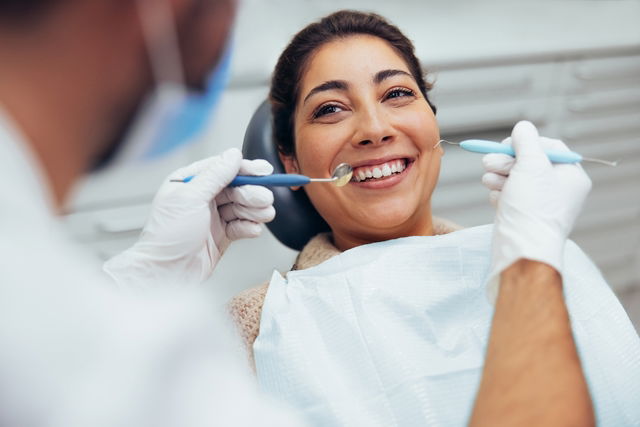The roof of the mouth can hurt due to hard or hot foods, ill-fitting dentures, fungal infections, mucoceles, dehydration, cancer or burning mouth syndrome.
If you notice other symptoms in addition to pain in the roof of the mouth, like bad breath, wounds that do not heal, throat irritation, and white spots around the mouth, you should see a doctor or dentist fo further assessment. The doctor can help to identify the cause and initiate treatment as needed.
Treatment for a sore roof of the mouth depends on the cause, and the doctor may advise medications, dietary changes or even surgery in some cases.

Why causes roof of mouth pain?
The main causes of pain and wounds on the roof of the mouth are:
1. Eating hot or hard food
Eating or drinking very hot, acidic or spicy foods and drinking, or eating very hard food can cause damage to the roof of the mouth. This can lead to pain and burning in the area.
What to do: To prevent intense pain, you should avoid eating more acidic or spicy foods. You can apply a healing gel to the roof of the mouth, which forms a protective barrier against further injury.
To prevent these types of lesions, you should aboird eating foods that are super hot and be careful with tougher foods like toast or with the bone in.
2. Ill-fitting dental equipment
Using ill-fitting dentures or braces can lead to pain in the roof of the mouth.
What to do: It is important to consult a dentist for assessment of the dental pieces and to adjust them as necessary. To speed-up healing, the dentist can prescribe healing ointments, especially if wounds of formed in the roof of the mouth.
3. Canker sores
Canker sores are small wounds that can emerge in the mouth or throat. They can impede with talking, eating and swallowing, and can worsen with the consumption of certain foods and drinks. Learn more about what causes canker sores and the symptoms they can present with.
What to do: To cure a canker sore, you can perform warm water and salt gargles and apply specific canker sore healing ointments to affected areas.
4. Dehydration
Dehydration, caused by inadequate water intake or medications, can lead to the sensation of a dry mouth, as well as pain and swelling at the roof of the mouth. It can increase the risk for the development of wounds in the upper mouth.
What to do: It is important to drink at least 2 liters of water per day and to eat water-rich foods, like watermelon, tomato, rasich and pineapple. You should avoid drinking alcohol, as this increases the risk for dehydration.
5. Fungal infection
A fungal infection, mainly caused by Candida albicans, can also lead to pain at the roof of the mouth. It can also lead to white spots in the mouth, canker sores and a burning sensation.
What to do: It is important to see a doctor for assessment. If a fungal infection is confirmed, treatment will be initiated. It usually involves the use of antifungals in gel, liquid of mouth gargle form.
6. Mucocele
Mucoceles are a type of blister that can form on the roof of the mouth, lips, tongue or cheeks following direct trauma, bites or obstruction of the salivary gland. It can cause pain and discomfort and can grow to a size of millimeters to 3 cm in diameter.
What to do: Mucoceles resolve on their own without any necessary treatment, although some cases may require surgical removal of the mucocele. Learn more about mucoceles, the symptoms associated with them and how they are treated.
7. Burning mouth syndrome
A burning mouth is a condition that can make any part of the mouth burn. In addition to experiencing pain at the roof of the mouth, it can also cause mouth tingling or changes to taste.
What to do: It is important to consult an ENT specialist or dentist to confirm burning mouth syndrome so that treatment to relieve symptoms can be initiated. Treatment depends on the underlying cause, but may involve medications, dental procedures or applying ice.
8. Cancer
Although it is more rare, in some cases, the roof of the mouth can hurt as a result of oral cancer. Some signs and symptoms of mouth cancer include foul breath, frequent canker sores, long healing times, red or white spots on the mouth and throat irritation.
What to do: If you notice these symptoms, you should see a family doctor as quickly as possible to confirm a diagnosis and prevent further complications.
9. COVID-19
Infection with the SARS-CoV-2 virus can also increase your risk for painful wounds at the roof of the mouth. Many people may also notice changes to taste and a dry mouth. Learn more about the symptoms of COVID-19 and how it is transmitted.
What to do: If COVID-19 is confirmed, you are advised to remain in isolation, drink plenty of fluids and adhere to a light, easy-to-digest diet to speed-up reovery. If you experience other symptoms, like sore throat, headache and fever, the doctor can prescribe analgesics and anti-inflammatories.
